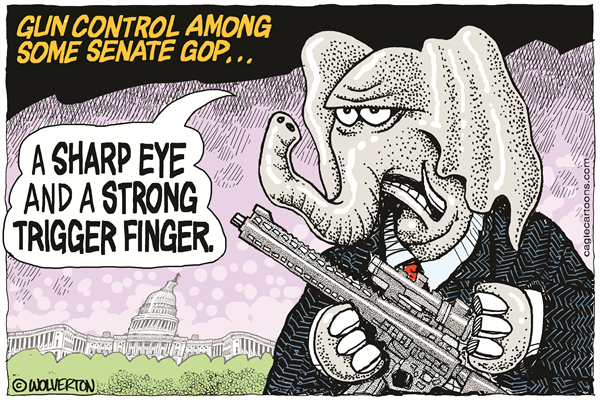Answering gun owners' complaints about privacy
Brown University
Proposals to create a national gun registry have long been met with fierce opposition from gun rights advocates.
They propose a database that uses advanced encryption to protect privacy. The encryption scheme allows the database to be searched without being decrypted, which means people querying the database see only the records they’re looking for and nothing else.
Meanwhile, the system places control of data in the hands
of county-level officials rather than the federal government, meaning county
officials have control over which queries are answered, and can even pull the
county’s data offline entirely if they’re not comfortable with how it’s being
used.
The proposed system is the work of Seny Kamara, a professor of computer science at Brown, along with co-authors Tarik Moataz, Andrew Park and Lucy Qin. Moataz is a visiting scientist at Brown. Park is a Brown master’s student, and Qin is a Ph.D. student in Kamara’s lab.
They developed the system after Ron Wyden, a
U.S. Senator from Oregon, contacted them looking for ideas on how such a
database might be constructed.
“The
senator’s office had this idea for a database where counties are incentivized
to participate, but they could pull out at any time,” Kamara said. “At the same
time, there are obvious privacy concerns. This idea of being able to query and
process data without decrypting it is something I have worked on for the last
20 years, so that’s why the senator reached out to us. This research was about
showing whether it was possible to design something like this.”
The study, which was
accepted to the IEEE Symposium on Security and Privacy and will be presented in
May, concludes that such a system is not only possible, but quite practical.
I
think this is an example of how you can have technology folks and policymakers
working in concert, and it changes the conversation.
–
Seny Kamara, associate professor of computer science
The
proposed registry would contain the make, model and serial number of all
legally owned guns in each participating county, along with a registration number
identifying gun owners. The information in each county database would be fully
encrypted, and only a designated county official would hold the key to
decrypting their own local data.
Each county’s encrypted data would be searchable by authorized users elsewhere (authorized users would include law enforcement, county officials or gun sellers). For example, a law enforcement officer might query the system with the serial number of a gun found at a crime scene.
Without ever decrypting the
data, the system would locate the county database containing that serial
number. The officer would then be able to decrypt the relevant record, as long
as the country official controlling the data has enabled it to do so.
The
search algorithm provides a high level of security because the data is never
decrypted during the search process.
“All
of the servers that are storing the data and all of the computers that are
doing these operations, they're just processing encrypted data and they never
actually see anything,” Kamara said. “That provides really strong privacy
throughout the process because none of the data can ever be seen without the
decryption key.”
Kamara
and his colleagues envision the decryption key as a physical device — like a
thumb drive — that can be placed in a local computer to authorize transactions.
“If
at some point a county decides they don’t want to be part of the system
anymore, the official just pulls that hardware token out of the laptop and
that’s it — nothing works,” he said. “The data is encrypted and the key is
unavailable, so nothing can happen. For the senator’s office, that ability for
counties to walk away and basically pull their data offline was really
important.”
For
their study, the researchers created a mock-up of the database with synthetic
data and showed that searches were computationally practical, with results
returned in a minute or less. The analysis also found that the costs associated
with the system would be relatively small. Each county database could be stored
for less than $1,000 per year, and the global directory would cost less than
$500 per year.
Kamara
says that the work so far is a proof-of-concept that would require some
additional refinement to be implemented. But as it is, he says, the work shows
the value of bringing technical expertise to bear on policy issues.
“I
think people imagine this registry and think everything would be public and
there would be all kinds of problems associated with that,” he said. “But with
advanced cryptography, that’s not necessarily true. So I think this is an
example of how you can have technology folks and policymakers working in
concert, and it changes the conversation. It’s been a really great
collaboration."
